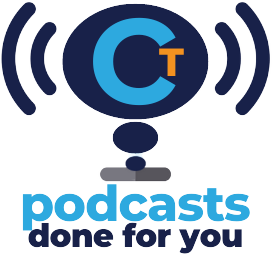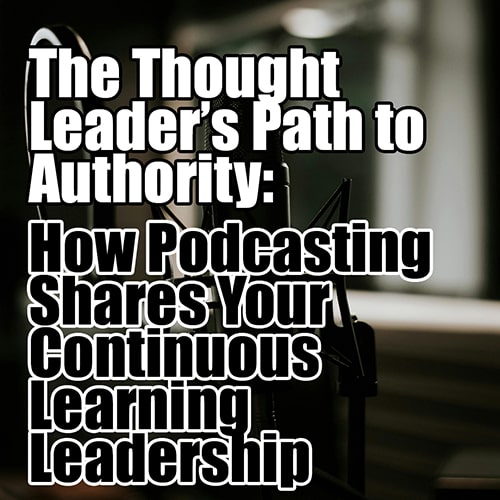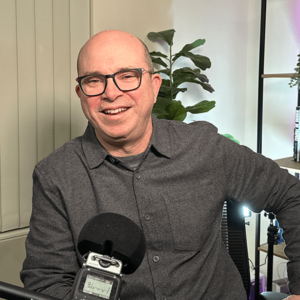I am going to state the obvious…
If you stop learning, you stop growing, and your business will slowly disappear.
The truth is there is lots you learn on the job, especially if you are willing to listen to your team, your customers, your suppliers and the myriad of new technologies being released daily. But the question is, how structured are you in your approach?
We tend to think of education as being something that is done before you start working, or for academics and learning being more on the job. However, today’s thought leaders understand that education is ongoing, structured, and essential for business growth.
In a recent episode of my Biz Bites for Thought Leaders podcast, I had a wonderful conversation with Joanne Brooks, whom I have known for a number of years. Joanne is the founder of Navig8 Biz and self-described “Circle Builder,” and our discussion revealed powerful insights about the transformative power of education in business and thought leadership.
The Education-Leadership Connection
The traditional view of education as something completed before entering the workforce is outdated. As I discussed with Joanne, continuous education is what separates true thought leaders from the rest.
During our conversation, I highlighted this shift in thinking: “We tend to think of education as being something that is done before you start working, or for academics and learning being more on the job.” However, the reality is that continuous learning is essential for thought leadership development.
Joanne, who recently completed her MBA, shared a powerful perspective on education’s role in business development: “What has helped me to redefine my marketing message, my branding, and my focus has been a direct relation to my completing my MBA. Circle Builder came out of my final project, and rebranding came out of my marketing subject that I did.”
This practical application of education directly to business challenges represents a new paradigm in professional development, one where learning and implementation happen simultaneously.
Beyond Traditional Educational Paths
One of the most compelling insights from our conversation is how education for thought leaders has evolved beyond traditional pathways. Joanne explained her journey: “I’m someone who was never given the chance to go to university. So it was definitely a bucket list item for me. I’ve done a myriad of certificates and diplomas.”
This sentiment resonates with many entrepreneurs who may not have followed conventional educational routes but are nonetheless committed to continuous learning. Our discussion revealed how alternative educational paths can be equally, if not more valuable, for developing thought leadership.
I reinforced this point during our talk: “The education system, a lot of people’s view of how it works is not actually the reality of how it works… There are ways of getting the education without having to do [traditional paths].”
For aspiring thought leaders, this means recognising that education comes in many forms-from formal degrees to coaching, mentorship, and self-directed learning.
Learning from World-Class Experts
What makes education particularly valuable for thought leaders is access to insights from those who have achieved remarkable success. Joanne shared her experience with MBA programs that feature learning from global leaders:
“The entrepreneurs that he’s got woven through in video interviews and the written content are people like our past prime ministers, heads of state, the head of the CIA, Goldie Horn, Desmond Tutu, Julia Gillard, just to name a few of them. And a lovely equal spread of men and women.”
She continued, “If you’re going to learn negotiation skills, who doesn’t want to learn it from the person who’s been the head of the CIA? I think he’s got something to share.”
This approach to education-learning directly from those who have mastered their fields – is particularly valuable for thought leaders who aim to bring fresh, authoritative perspectives to their audiences.
The Practical Application of Learning
What separates effective educational experiences from mere credential-collecting is the practical application of knowledge. Joanne emphasised how her educational journey directly impacted her business:
“We all know we should work on our business, but we often don’t make the time to do that. So we’ve got a double whammy if you like. We can work on our business and build our skillset to step into our CEOship.”
During our discussion, I built on this idea, noting that education should challenge thinking and stimulate new ideas: “I see it as being on two levels… one is about making you aware of certain things that you might not have awareness of. And the other part is stimulating new ideas so you think about new things and different ways that ultimately then you can deliver for whether it’s your business or ultimately clients.”
This practical application is what transforms education from a theoretical exercise into a catalyst for thought leadership.
Sharing Knowledge: The Essence of Thought Leadership
Perhaps the most important insight from our conversation is that education alone isn’t enough – thought leaders must share their knowledge to make an impact.
Here is the thing about education and learning: you need to share it. Yes, within the context of your business and team, you can make changes, but it needs to go beyond that if you want to then be seen as an authority.
This sharing of knowledge – whether through podcasting, writing, speaking, or teaching – is what transforms an educated business person into a true thought leader. It’s about taking what you’ve learned and using it to elevate others.
Joanne exemplifies this approach through her Circle Builder concept: “It’s about bringing women together in circle to support them in their growth strategy… Circle is a concept that’s eons old. We’re very used to sitting in circle and supporting, guiding one another.”
The Continuous Learning Mindset
Both Joanne and I emphasised that thought leadership requires a continuous learning mindset – one that never assumes complete mastery.
Joanne drew a powerful parallel: “You think about so many professional sports people out there, they have coaches until they retire and probably become a coach themselves. So can you think about the professional footballers and tennis players? ‘Oh, I’ve landed, I’m now a professional. I don’t need a coach anymore.’ Well, that’s just not the case, right? So why does this happen in business?”
This observation highlights a critical mindset shift for thought leaders – recognising that learning is never complete, especially in rapidly changing fields.
I added: “I know from coaching I’ve had over the years that I can see it playing out when I’m sitting in front of a client and going, ‘Well, what if we did this?’ And I’m thinking in the back of my mind, ‘That’s how I was taught, wasn’t it?’ That’s how it keeps advancing.”
Credibility Through Continuous Education
In a landscape filled with self-proclaimed experts, continuous education provides thought leaders with genuine credibility. Joanne emphasised the importance of verifying expertise:
“When you are looking for a coach, and let’s say you’re looking for a financial coach, have the courage to say, ‘How’s your financials?’ If you’re looking for a sales coach, ‘How’s your sales?’ Because if they’re a coach in that expertise, we have to quality check their credibility.”
This transparency about one’s own learning journey and expertise is what builds trust with audiences and clients. Thought leaders who openly discuss their educational experiences – both successes and challenges – create authentic connections.
I reinforced this point: “I think it’s a pity that when we’re asked to put in our resume for want of a better term, even in a place like LinkedIn, that it doesn’t really allow you to say, ‘Well, I’ve been participating actively in coaching for X amount of years with this kind of caliber of people.'”
Making Education Accessible
True thought leaders not only pursue education for themselves but also make learning accessible to others. Joanne describes her approach:
“I have therefore created a platform for easy entry into coaching for any female entrepreneur… I wanted to create a circle, a place that was safe for women, whether they’re brand new to business or whether they’re in the messy middle.”
This democratisation of education – making high-quality learning available at various price points and formats – is a hallmark of effective thought leadership in the podcasting space and beyond.
The Impact of Advanced Thinking
When thought leaders commit to continuous education and share their insights, the impact extends far beyond their immediate circle. Imagine the impact of your advanced thinking and insights on a broader audience. They will start seeking you out.
This magnetic effect – where expertise naturally attracts an audience – is the ultimate goal of thought leadership. It’s not about self-promotion but about creating such valuable insights through continuous learning that others naturally gravitate toward your perspective.
Podcasting: Your Platform for Thought Leadership
One of the most effective ways to share your knowledge and establish yourself as a thought leader is through podcasting. As I’ve experienced firsthand with my Biz Bites for Thought Leaders podcast, this medium allows you to:
- Share your expertise with a global audience
- Connect with other thought leaders through meaningful conversations
- Demonstrate your knowledge in a format that builds genuine connection
- Create a body of work that showcases your thought leadership journey
- Establish authority in your field through consistent knowledge sharing
Podcasting isn’t just about broadcasting your voice – it’s about creating a platform where your continuous learning can be shared, discussed, and implemented by others.
Ready to Amplify Your Thought Leadership?
If you’re committed to continuous learning and ready to share your expertise with the world, podcasting might be the perfect platform for you. I’d welcome the opportunity to discuss how podcasting can elevate your thought leadership and help you make a broader impact.
Whether you’re just starting your thought leadership journey or looking to amplify your existing expertise, I can help you navigate the podcasting landscape and create a show that truly reflects your unique insights.
Let’s chat about how podcasting can become your most powerful tool for sharing your continuous learning and establishing your authority. Book a conversation with me today to explore the possibilities.
What are you doing to advance your education and learning? How could podcasting help you share those insights and establish yourself as a thought leader in your field? I’d love to hear your thoughts and help you explore the answers to these questions.
Book a free conversation here about the possibilities for your podcast.


